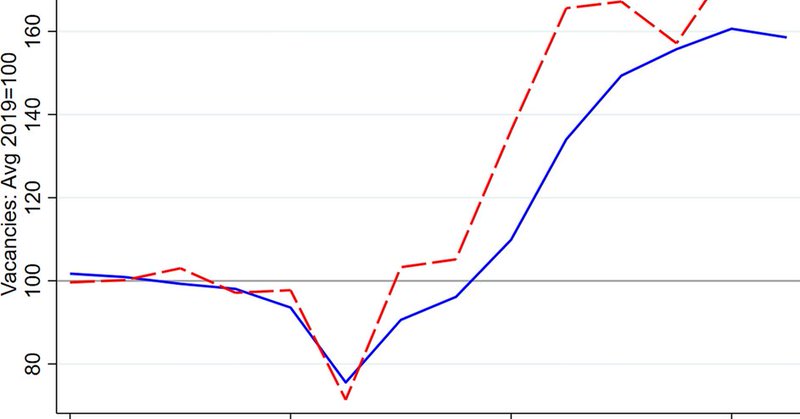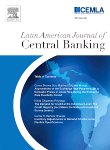
Ippei Shibata
@ShibataEcon
Followers
230
Following
118
Media
3
Statuses
111
Economist at the IMF. Views are my own and do not represent any of my affiliated institutions.
Washington, DC
Joined September 2014
It's always rewarding to see your own paper cited in an important policy document. My joint work with Carlo on labor market mismatch was cited in 2025 Economic Report of the President
0
0
4
Delighted to share that my paper titled “Central Bank Independence and Inflation in Latin America—Through the Lens of History” (with @LuisIJacome1) is now available online at the JMCB. Link:
onlinelibrary.wiley.com
We study the link between central bank independence and inflation by providing narrative and empirical evidence based on Latin America's historical experience. Using a novel historical data set of...
1
2
11
Why do some people support labor market regulation while others oppose it? Does one’s opinion reflect endowments (such as income and wealth) or beliefs, rooted in ideology (e.g. political views) and (mis)information? Check out our newly published paper:
academic.oup.com
SUMMARY. Are preferences for labour regulations driven by individuals’ own endowments or their beliefs? To address this question, we conducted a cross-coun
0
1
6
3) Digital occupations in urban areas and cognitive occupations were particularly insulated.
0
0
0
2) This temporary increase was driven by a smaller decline in employment and vacancies for digital occupations relative to non-digital ones, rather than an absolute increase for digital workers.
0
0
0
We find: 1) COVID-19 increased employment and vacancies for digital occupations, but the increase was temporary.
0
0
0
My joint paper with my amazing coauthors (Jiaming, Carlo, Myrto, and Marina), “Did the Covid-19 Recession Increase the Demand for Digital Occupations in the USA? Evidence from Employment and Vacancies Data,” has been published in the IMF Economic Review.
link.springer.com
IMF Economic Review - This paper investigates whether Covid-19 increased the demand for digital occupations in the United States. Using O*NET data to capture the occupations’ digital content,...
4
1
12
Happy to receive the Best Research Paper award for a paper on fintech and banking, published in LAJCB. First time to receive such an award! Many thanks to my amazing coauthors.
linkedin.com
We are happy to announce the winners of the 2022 Latin American Journal of Central Banking Best Article Prize. 🥇 The prize for the best #research article was awarded to Pablo Bejar, Kotaro Ishi,...
1
0
6
FT ( https://t.co/rejXR6LRLs) and Economist ( https://t.co/QWXFNkcGme) mentioned our joint work on hours worked.
economist.com
Americans are no longer the rich world’s great office drones
1
1
11
Average hours per worker in #Europe have not recovered to their pre-COVID level. This follows a long-term trend that predates #COVID-19 & reflects worker preferences. D Astinova @nyuniversity, R Duval, N Hansen, H Park, @ShibataEcon & F Toscani @IMFNews
https://t.co/layjldLbvZ
1
1
1
VOXEU column on my joint paper on average hours worked is out.
cepr.org
Three years after the COVID-19 crisis, average hours per worker in Europe have not recovered to their pre-pandemic level. This column explains that this decline is not cyclical but predominantly...
0
1
2
My joint paper “Dissecting the Decline in Average Hours Worked in Europe” with coauthors is out. #Europe #LaborMarket #HoursWorked #IntensiveMargin #COVID19
1/9 Why are European workers putting in less hours than they did prior to the pandemic, even though employment has more than fully recovered? We look at this conundrum in our new IMF working paper: https://t.co/84enn1EY6O. We find:
0
1
5
1/9 Why are European workers putting in less hours than they did prior to the pandemic, even though employment has more than fully recovered? We look at this conundrum in our new IMF working paper: https://t.co/84enn1EY6O. We find:
1
4
4
Very happy to see our paper out at the Journal of Public Economics @JPubEcon ! TL; DR: Governments can substantially increase the take-up of public services using digital tools! with @BenRoseth Ana Cuesta & Mario Sanchez https://t.co/U6xjx1uTtH
3
10
89
Why do some people strongly support protecting workers against layoffs while others don’t? A survey of 7000 individuals in 14 countries conducted by Yi Ji @WorldBank, Romain Duval, Chris Papageorgiou, @ShibataEcon & @spilimb1 @IMFNews finds that...
1
2
7
@johnbluedorn @njharbo @tavares_mm workers in pollution-intensive jobs, even after controlling for individual characteristics (like educational attainment). (3/3)
0
0
0
@johnbluedorn @njharbo @tavares_mm from a labor market perspective. That said, it may be a challenge for individual workers, in general, workers rarely move from more pollution-intensive to greener jobs. This is despite the fact that we find that workers in green-intensive jobs earn on average 7% more than (2/n)
0
0
0
@johnbluedorn @njharbo @tavares_mm We construct new cross-country harmonized measures of jobs’ green, pollution, and emissions intensities using micro data and find that greener and more polluting jobs are concentrated among small subsets of workers, suggesting that the green transition may be more manageable(1/n)
0
0
1













